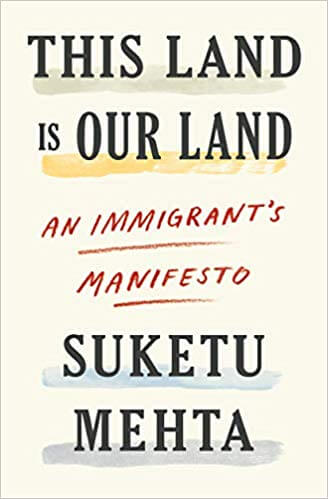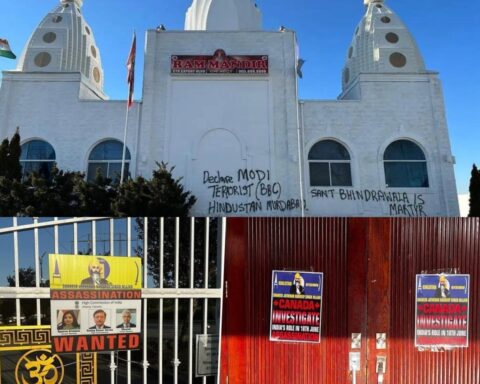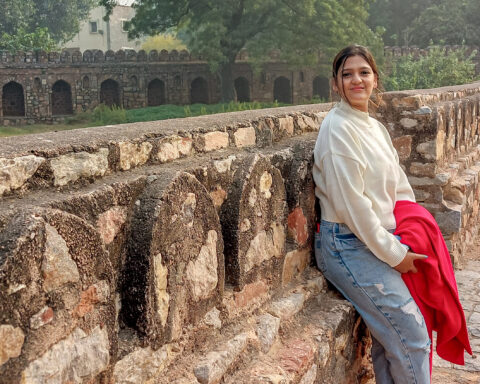Born in Kolkata, India, Suketu Mehta’s earlier book “Maximum City: Bombay Lost and Found” won the Kiriyama Prize and the Hutch Crossword Book Award. He’s been published in Time, The New York Times, and Harper’s Magazine. He lives in New York and is an associate professor of journalism at New York University.
The first page of his new book, “This Land is Our Land: An Immigrant’s Manifesto”, recounts when his grandfather was in a London park. An elderly Briton came to wag a finger in his face and ask, “Why are you in my country?” His grandfather, born in India and retired in London after working in Kenya replied, “Because we are the creditors. You took all our wealth, our diamonds. Now we have come to collect.”
This sets the tone of the book. Over the rest of it, Mehta shows why the millions of migrants in the world today have a right to move to the western countries which pillaged their homelands in one way or another, making life no longer possible for them there. For this reason, they don’t fear death or being parted from their children.
Mehta refers to “This Land is Your Land,” a famous 1940 American folk song composed and sung by Woody Guthrie, based on a tune called “When the World’s on Fire,” which was to rebut Irving Berlin’s “God Bless America.” Guthrie was fed up of hearing “God Bless America” on the radio in the 1930s. Mehta quotes a few of the lyrics, including:
“In the shadow of the steeple I saw my people,
By the relief office I seen my people;
As they stood there hungry, I stood there asking,
raIs this land made for you and me?”
Promised Land
The book has four well-researched and well-argued parts:
- The migrants are coming
- Why they’re coming
- Why they’re feared
- Why they should be welcomed
Every day, Adam and Eve are trying to get into the Garden of Eden covertly because of “survival migration.” Oxford’s Alexander Betts is aptly quoted as saying migrants are “people who have left their country of origin because of an existential threat for which they have no domestic remedy.”
A new form of global class structure has evolved in which white parents in the developed world hire nannies from Cameroon or the Philippines to leave their own children and come look after white ones in the west. This enables the white woman to develop her career or shop. “… they spend their lives caring for somebody else’s child while their own are strangers to them. And little by little, the child they are paid to take care of starts occupying a bigger place in their hearts than the ones that came out of their bodies.”
A state like Guinea may have 36 per cent of the world’s gold, diamonds, and bauxite — but those are for western corporations like Och-Ziff Capital Management and Rio Tinto to exploit while the populace lives in Dickensian poverty.
Mehta describes how “Every year, $150 billion leaves Africa for overseas tax havens,” causing migrants like Khalil, his wife and their baby to come to Tangiers, a city in Morocco, North Africa, “and look past the yachts toward the cliffs of Andalusia. Tangier is the last step of the long journey across Africa. You can see El Dorado, just fourteen kilometres across the strait.”
They’re waiting until the baby is a month old before making the crossing, fully aware of the risk of dying in the attempt. But this is the last leg after crossing mountains and deserts. They can’t go back now, when they can see Spain, the Promised Land.
Colonialism, war and climate change
When such migrants move, it’s not out of impure imaginings, hatred for their societies, or to maraud developed countries. It’s because historical events like colonialist or neo-colonialist exploitation have made their erstwhile homes uninhabitable.
“They are here because you were there,” writes Mehta. “Consider the subcontinent. For 5,000 years we had been one people, ruled undivided from the borders of Persia to China by emperors from Ashoka to Akbar … Periodically, parts of us broke off into independent kingdoms or suzerainties and then came back together.
“Then the British came and ruled us for 200 years by pitting us against each other so that we couldn’t be pitted against them, and now for 70 years we have been split into three nations … And the governments of all three emphasize how ‘we’ are so different from the others.”
Mehta explains how the British-Indian policy of “divide and rule” drove wedges between religious groups, especially favouring the Muslim League. Patrick Spens, chief justice of the Federal Court of India and Chair of the 1947 Arbitral Tribunal, was asked the causes of the bloodshed during partition, in London 1963.
Spens said, “The main cause was the haste with which we parted with India. The connections of centuries were severed within days without any proper thought … The Labour Government here wanted to get rid of India as quickly as possible.”
Oh Canada
The (rare) use of words like “shit” and “fucked up” may be indicators of Mehta’s anger at white peoples’ unwelcoming attitude towards coloured migrants from countries they’ve ravaged. U.S. attitudes find an echo in Canada. I recall awaiting a Winnipeg bus in 2015 when a white man in his 30s walked past saying, “Go back where you came from, you fucking immigrant!” When this writer replied, “YOU go back where you came from.” He replied, “I was born here! This is my country!” I replied, “Fuck off,” gesturing to him to move along.
That was my only such experience in 21 years here, but immigration has gradually climbed as a political issue in Canada.
The right-wing People’s Party of Canada, founded by Maxime Bernier, lists on its election platform its goal to dramatically reduce immigration levels, end official multiculturalism and put a stop to Canada’s open-borders refugee policy.
“Immigrant” has, of course, evolved into code for “coloured person” ever since the old sources of white Europeans dried up. Other parties also nurse such objectives, having done precious little to remove the barriers faced by skilled Asian and African immigrants entering into their professions — despite getting points for their qualifications under the current vetting system.
Canada is still underpopulated, so it could accommodate the miserable of the earth, like the Palestinians, the Jews or the Kashmiris — if only its “leaders” read this excellent book.
Ashoke Dasgupta is a freelance journalist and former editor of Compassionate Friend, Beauty Without Cruelty-India's magazine. He won a UNDP - Goethe Institute Award for Environmental Journalism in Nepal 1995, and the Canadian Ethnic Media Association's Best News/Feature Awards for 2004 and 2006. He got a scholarship to study journalism at Sheridan College Toronto in 2007, graduating with high honours. He has done internships at the Winnipeg Free Press and CBC Radio, and been published in the Winnipeg Free Press, the Calgary Herald and the Toronto Star.





